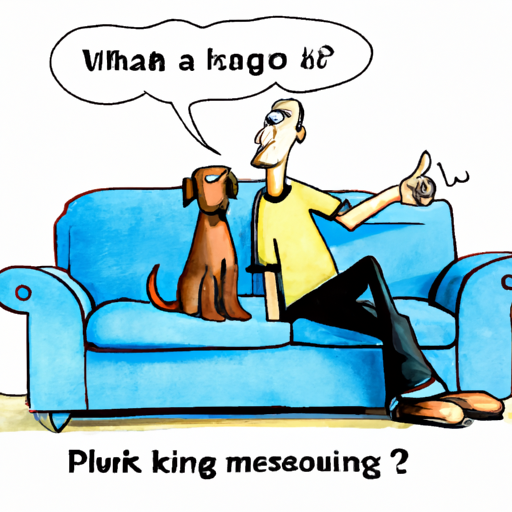You, as a loving and caring pet owner, have probably experienced a moment when your furry friend reaches out and gently, or not-so-gently, taps you with their paw. This behavior can be puzzling, charming or even annoying. But what does it mean? In this comprehensive guide, we will delve into the reasons why your dog might be hitting you with their paw.
1. Seeking Attention
Your dog is a social creature who craves your attention. Just like a toddler tugging at your pants, your dog might paw at you to grab your attention. This is especially true if they want something, like their favorite toy or a much-needed walk.
Here are few signs to watch for:
- Persistent pawing: If your dog is pawing you relentlessly, it’s a clear sign they want your attention.
- Eager body language: If your dog is wagging their tail and jumping around while pawing at you, they are probably trying to get your attention.
2. Expressing Emotion
Dogs are emotional beings, and they often use their paws to communicate their feelings. Your dog might paw at you when they are feeling anxious, excited, or affectionate.
- Anxiety: If your dog paws at you and then hides or displays other signs of anxiety, they might be feeling scared or nervous.
- Excitement: If your dog paws at you during play or when you come home, they are likely expressing their joy and excitement.
- Affection: Dogs often paw at their owners as a sign of love and affection.
3. Requesting Something
Dogs are smart, and they quickly learn that pawing can get them what they want. If your dog paws at you before mealtime or when they want to play, they are likely requesting something specific.
Consider these factors:
- Time of day: If your dog consistently paws at you around mealtime, they might be asking for food.
- Presence of a toy: If your dog paws at you while holding a toy in their mouth, they probably want to play.
4. Showing Dominance
Sometimes, dogs use their paws to assert dominance. If your dog is pawing at you aggressively or in a way that seems assertive, they might be trying to establish dominance.
Here’s what to look for:
- Aggressive body language: If your dog is showing aggressive body language, like raised hackles or bared teeth, while pawing at you, they might be trying to assert dominance.
- Pawing at other dogs: If your dog paws at other dogs in the same way they paw at you, they might be trying to establish dominance.
5. Indicating Health Issues
If your dog’s pawing behavior is new, sudden, or excessive, it might be a sign of a health issue. Your dog might be pawing at you because they are in pain or discomfort. In this case, it’s important to consult with a vet.
Watch for these changes:
- Changes in behavior: If your dog’s pawing behavior changes suddenly or dramatically, it might be a sign of a health issue.
- Other signs of discomfort: If your dog is displaying other signs of discomfort, like limping or excessive licking, along with pawing, they might be in pain.
FAQs
Why does my dog paw at me when I pet them?
Your dog might paw at you during petting to show affection or to control the petting. If your dog seems relaxed and happy while pawing at you, they are likely just enjoying the affection.
What should I do when my dog paws at me?
It depends on the reason for the pawing. If your dog is pawing at you for attention or to request something, you can respond by giving them what they want, as long as it’s reasonable. If your dog is pawing at you to assert dominance, it’s important to address this behavior with appropriate training.
How can I tell if my dog’s pawing is a sign of a health issue?
If your dog’s pawing is accompanied by other signs of discomfort, such as limping, loss of appetite, or changes in behavior, it might be a sign of a health issue. In this case, you should consult with a vet.
Is it bad to let my dog paw at me?
Not necessarily. Pawing can be a normal and harmless way for dogs to communicate. However, if your dog’s pawing is aggressive, excessive, or causing problems, it might be a good idea to address this behavior with training or veterinary consultation.
Can I train my dog to stop pawing?
Yes, with patience and consistency, you can train your dog to stop pawing. It’s important to remember that training should always be done in a positive, reward-based manner.



